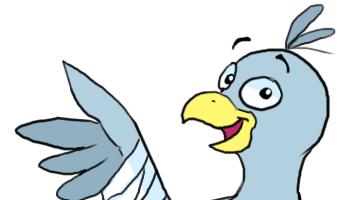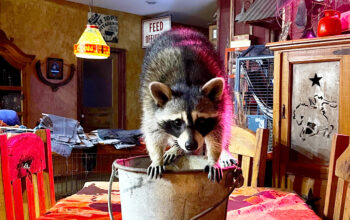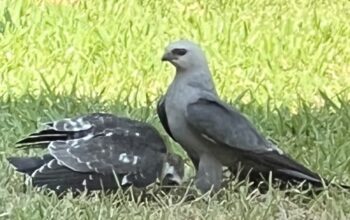A 501c3 Non Profit
All Volunteer Organization for the Care of Birds and God’s other creatures
From the Chief Pooper Scooper
A 501c3 Non Profit
All Volunteer Organization for the Care of Birds and God’s other creatures
From the Chief Pooper Scooper
Happy New Year everyone! I want to apologize for never getting a December Newsletter out, but until the days get longer or I get younger, some things will have to wait. Or, someone out there can do the newsletter for Bird Tails. That would be the best solution of all. We have added to the roster of volunteers that are coming out regularly to feed, clean, and make bird toys. They are a huge blessing. This is not a “one man show” and having so many willing hands has made it possible to take in more birds and work on other project.
Such as:
• Senior Sitter program: on hold through the cold weather but Jackie Smith has been making visits to retirement centers to let them know what we are doing. The Weatherford Farmers Market, who has been donating produce to us for over a month now, is also giving us plants, flowers, and herbs, to develop the seating spots around the cages. Once the weather improves we will be pushing to get some landscaping done and will need volunteers to come out to do the planting.
• Companion Therapy: we are in the research phase of this project to determine if birds, with their long life span can be trained to be therapeutic companions. This project is being headed by Dr Potter, who is also doing the bird assessments for us.
• Fund Raising Event for the birds sponsored by the Weatherford Farmers Market. We will wait for warmer weather on a first Monday weekend and the Farmers Market will open their large facility to the birds. The have even offered to put our name up on the billboard to promote the event.
• Jewelry made just for us by a local artist and volunteer is listed on Bird Tails and Facebook.
• I am slowly getting our birds listed on Petfinder.com for adoption. I already have many of them listed on Bird Tails.. We are a sanctuary and many of our birds are going to stay right here but occasionally we get a bird surrendered that needs his own human. I wan to make that happen. Selfishly I would keep everyone of these birds here and that is just wrong.
• We have a short respite while the winter weather gets terrible then we will be doing lots of planting around the aviaries and developing more seating areas. I am getting quote from suppliers for the construction of new outside aviaries. I always try for free first and when then when that fails, I got for cheap!
• We have gotten extra donations to cover the cost of a new freezer for all the produce we freeze for the birds.
Life is good, we have made new friends with Bird Haven and are talking of ways we can work together to take care of the bird. And finally I am going to the Parrot Festival the end of th e month, in Houston. I have never been before and will take pictures and write up a report for next months letter.
God Blesses us every day, expect it. Jean
Wings and Things
Having considered keeping your bird’s wings clipped if you want to take him/her outdoors, it is just as important to consider whether to keep them clipped if you are going to keep your bird indoors.
When I first met my baby Pionus, he was sitting on a perch with his sibling. I put out my hand, and he chose me, I did not choose him. He was too little at the time to bring right home (he was being hand fed and needed to stay where he was for two more weeks) but a day did not go by when I was not thinking about him.
When I returned, it was with his name, Poco, and great enthusiasm at the prospect of having my own baby bird. His Hatch-Mom, Sue, sent me away with some baby bird food to hand feed him for a few days, some ‘toddler’ food, and several stories that I will never forget along with some invaluable advice. One of them does not have a very happy ending (so you might want to skip the next paragraph) but it may be a story that saves your bird’s life as well as your peace of mind.
Sue told me about a woman, who was equally as excited as I was about making a bird a part of her family. She did not believe in keeping a bird’s wings clipped, and so allowed her bird quite a bit of freedom outside of her cage. One day she left a glass of iced tea on her counter. The bird, in its uninhibited curiosity, flew over to the glass and perched on the edge of it. I cannot bear to write the end of that story, but as I listened to Sue, I became determined to keep Poco’s wings clipped.
Sue told me a few other things that helped me stay firm in my decision. If you use overhead fans in your home, birds, in their effort to light upon the highest and closest thing possible, may end up turning that fan into a deadly weapon. If you use any kind of scent on your carpet, or have recently had your carpets cleaned, this can be a source of poison for your bird. Birds love to chew on things – including plugs. If they get too close to a portable heater they can be hurt and we do not even want to think what might happen if they fly too close to an open fireplace. They can fly into sinks filled with water, fly too close to a lit stove, or out an open door. Even your feet can become the enemy if they are walking across the floor and you are unaware of their presence.
These are not happy scenarios, but they are not always things that one considers (or wants to) as a new bird-parent. I choose to believe anyone who brings a bird into their home, takes their responsibility seriously, and want to protect them and provide them with a healthy happy environment.
Here is to our thriving birds, with or without clipped wings.
Jackie Smith
When Birds Can’t Weep
This is a reprint from the November Newsletter Plus the conclusion
Poppy was reared from an egg. His human parents chose his egg from the nest of a Cockatoo female, then took the newborn home to hand raise him with tenderness and human companionship.
A beloved member of the family for 11 years, Poppy’s situation appeared stable; that is, until his elderly mom developed a lung condition requiring clean air and oxygen. Her doctor said Poppy and his birdie dander had to go, and his heartsick parents released him to BirdLink Sanctuary. They left in tears.
Poppy didn’t cry, but he waited for them to return. He waited and he waited and, after several weeks, he gave up. He stopped talking, he could barely eat, and he sat in his cage lethargic, unable to play, or relate to the other birds.
Birds DO grieve. But like tiny humans, parrots can’t tell us, “I hurt,” “I want my family,” or “what happened?” And like young children, their emotions have to be interpreted through their behavior. A parrot’s human family easily recognizes whether the bird is happy or sad, fearful or content, just by how she acts.
But although bird lovers know better, many scientists see animals as incapable of feelings and accuse pet owners of attributing human characteristics of thought, feeling, and consciousness to their pets. However, even in the scientific world, there is now an increasing acceptance that birds and other animals do have and feel emotions. In fact, the most recent research evidence gives support to this view.
According to avian research, birds have all the brain parts they need to express a wide range of emotions. Birds, like mammals and humans, possess a specialized brain structure known as the limbic system, from which originates emotions like anger, joy, love, attachment, frustration, and grief. Their amygdala, the principal emotional comptroller within this system, similar to the human brain, connects with their forebrain to analyze situations and respond emotionally.
Increasing evidence also suggests that birds show the same mental capacities as the great apes, even in their ability to remember events, people, and to solve problems.
Part Two
They are also able to form abstract concepts like perishable and nonperishable, and to recognize differences in shapes and colors and, on their own, put words together to make meaningful phrases. In other words, birds can think, remember, become attached, and respond to situations, all of which are necessary for emotional expression.
But unlike humans, birds can’t shed tears, can’t smile or frown, and lack facial muscles to show emotional pain. That difference in expression often leads many humans (especially scientists) to believe that birds don’t grieve or feel depressed.
In fact, birds can grieve over any kind of loss: family, a favorite toy, a friend or mate, or a pet in the home. Observing a bird’s eyes, calling, wings, foot movement, beak, and overall posture can be helpful in determining when a bird is depressed. A grieving parrot may show a blank stare, call endlessly for the lost one, sit quietly, refuse to eat or play, or stop the crunching beak sounds that reveal contentment. These symptoms represent a cry for help from the suffering creature.
Emotional support, even in a severe case, can help a grieving bird recover more quickly and may even keep her alive since grief can be fatal to a bird. Giving the bird her favorite foods, intense affection, and frequent attention can help distract her from her sadness and minimize the feelings of loss. Some owners report good results from placing the former mate’s photo close to the cage.
Poppy lucked out at the Sanctuary. BirdLink directors immediately recognized his distress and found volunteers who took the sad little Cockatoo home for a few days to love him like his parents had. After returning him, they visited him everyday for a while taking him home periodically to help him adjust to his new life, while receiving the caring he so desperately needed.
It all worked out well for Poppy. He started eating, talking, and playing again; apparently moving through his heartache and learning to relate to other people who love birds.
It is now thought possible that even scientists may be capable of expressing feelings, and showing signs of empathy for other living beings.
iain39:thesun.co.uk




